Unit 4 A good read Grammar课件 (共25张PPT)2023-2024学年牛津译林版英语八年级下册
文档属性
| 名称 | Unit 4 A good read Grammar课件 (共25张PPT)2023-2024学年牛津译林版英语八年级下册 |
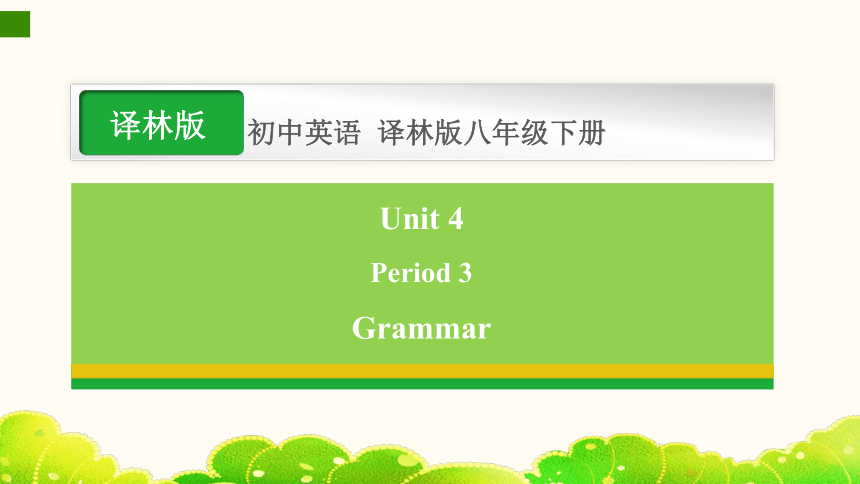
|
|
| 格式 | pptx | ||
| 文件大小 | 2.4MB | ||
| 资源类型 | 教案 | ||
| 版本资源 | 牛津译林版 | ||
| 科目 | 英语 | ||
| 更新时间 | 2024-01-03 10:37:53 | ||
图片预览

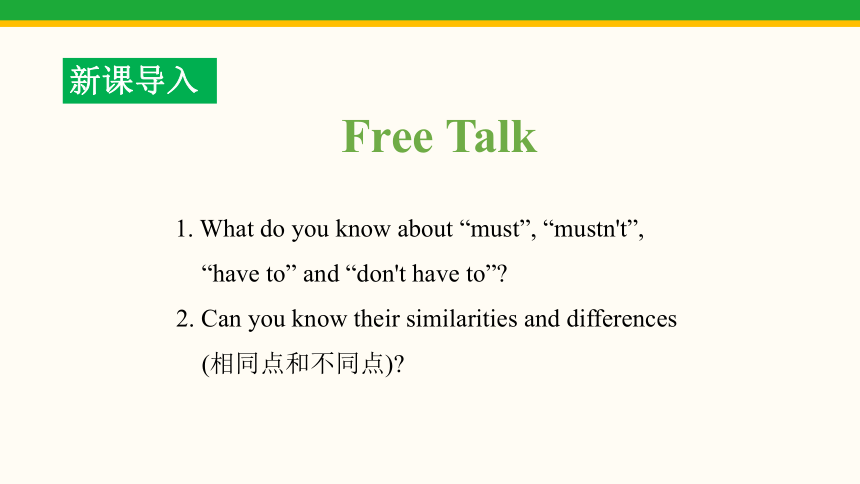
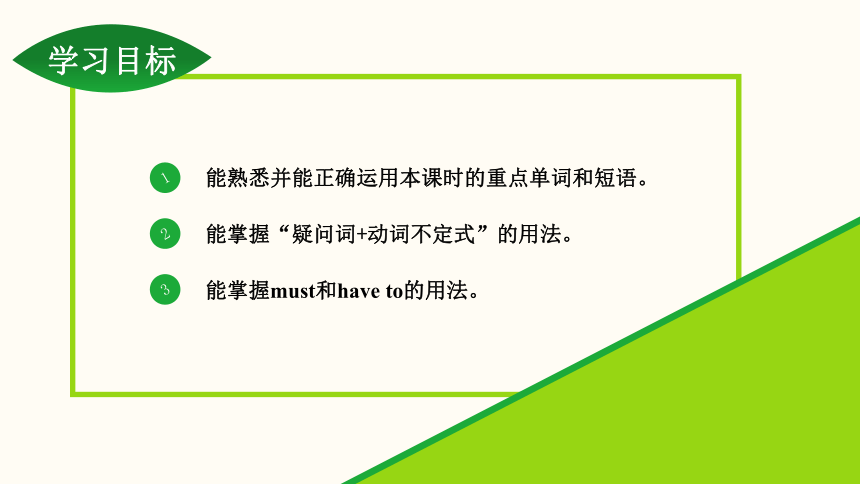

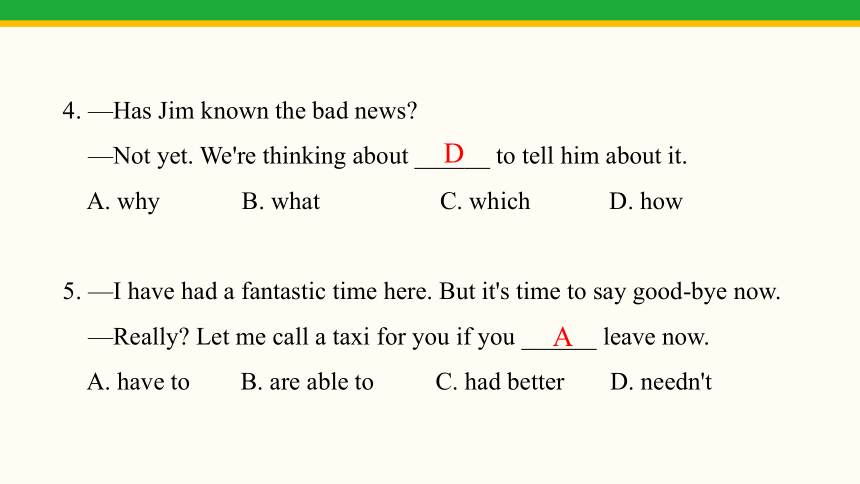
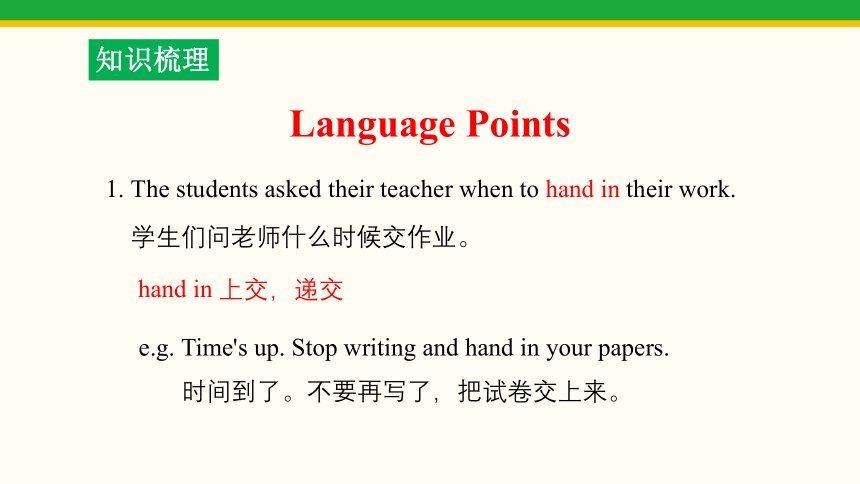
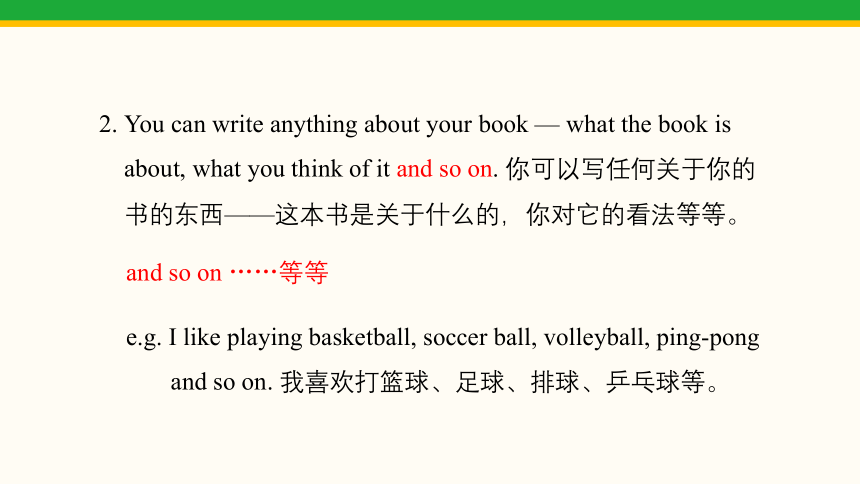
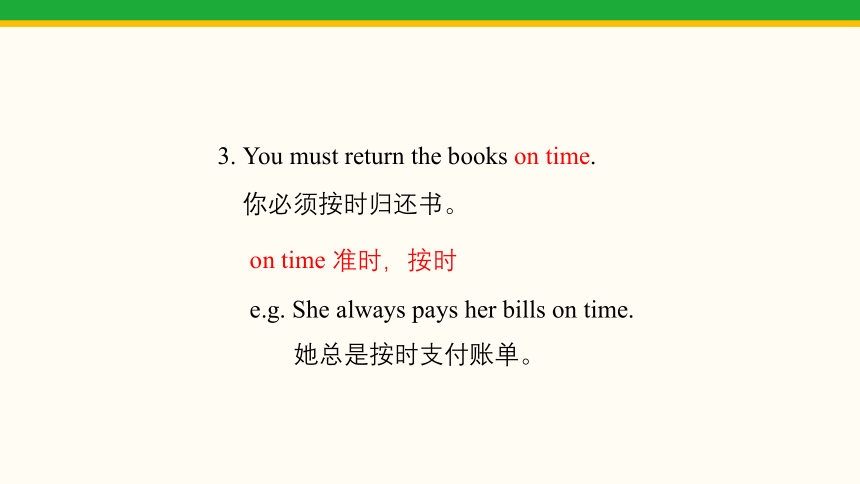
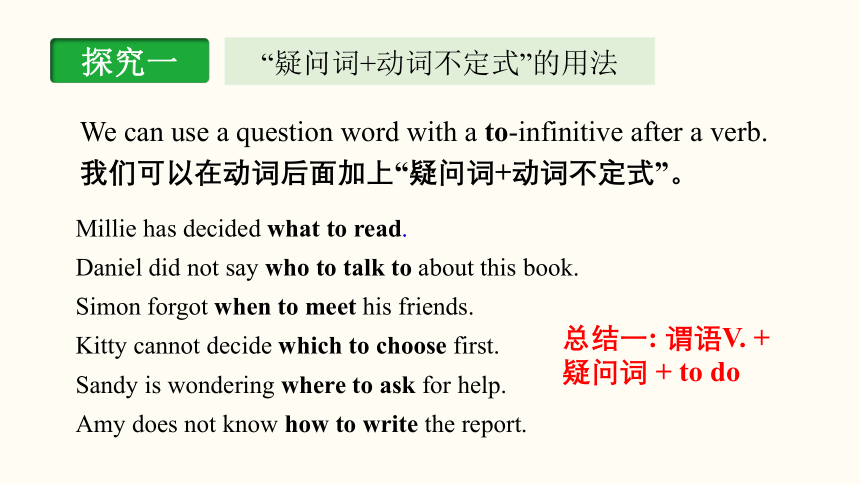
文档简介
(共25张PPT)
译林版
初中英语 译林版八年级下册
Unit 4
Period 3
Grammar
新课导入
Free Talk
1. What do you know about “must”, “mustn't”, “have to” and “don't have to”
2. Can you know their similarities and differences (相同点和不同点)
1
2
能熟悉并能正确运用本课时的重点单词和短语。
能掌握“疑问词+动词不定式”的用法。
3
能掌握must和have to的用法。
1. The maths problem was not difficult, but he didn't know ______.
A. what to do it B. how to do it C. how to do D. to do what
2. My mother was ill. I ______ stay at home to look after her.
A. must B. had to C. could D. can
3. —Whose book is this
—It ______ be our Geography teacher's. You see, his name is on it.
A. can't B. can C. mustn't D. must
预习检测
B
B
D
4. —Has Jim known the bad news
—Not yet. We're thinking about ______ to tell him about it.
A. why B. what C. which D. how
5. —I have had a fantastic time here. But it's time to say good-bye now.
—Really Let me call a taxi for you if you ______ leave now.
A. have to B. are able to C. had better D. needn't
D
A
知识梳理
Language Points
1. The students asked their teacher when to hand in their work.
学生们问老师什么时候交作业。
hand in 上交,递交
e.g. Time's up. Stop writing and hand in your papers. 时间到了。不要再写了,把试卷交上来。
2. You can write anything about your book — what the book is about, what you think of it and so on. 你可以写任何关于你的书的东西——这本书是关于什么的,你对它的看法等等。
and so on ……等等
e.g. I like playing basketball, soccer ball, volleyball, ping-pong and so on. 我喜欢打篮球、足球、排球、乒乓球等。
3. You must return the books on time.
你必须按时归还书。
on time 准时,按时
e.g. She always pays her bills on time.
她总是按时支付账单。
“疑问词+动词不定式”的用法
We can use a question word with a to-infinitive after a verb.
我们可以在动词后面加上“疑问词+动词不定式”。
Millie has decided what to read.
Daniel did not say who to talk to about this book.
Simon forgot when to meet his friends.
Kitty cannot decide which to choose first.
Sandy is wondering where to ask for help.
Amy does not know how to write the report.
总结一: 谓语V. + 疑问词 + to do
All question words can be used in this way, except why.
所有疑问词都可以这样使用,除了why。
√
×
Suzy will explain why to recommend this book.
Suzy will explain why she recommend this book.
We can use a verb + object before a question word with a to-infinitive. 我们可以在“疑问词+动词不定式”结构前用动词+宾语。
Mr Wu advised us which to choose as after-school activities.
The students asked their teacher when to hand in their work.
Millie showed us what to do next.
Daniel taught himself how to use a computer to draw.
Don't forget to tell your mum where to meet you.
advise ask decide discuss find out
forget know learn remember say show teach think understand wonder
总结二:谓语V. +宾语sb.+疑问词 +to do
We can use a noun after what, which, whose, how many and how much. 我们可以在what, which, whose, how many and how much后面用名词。
They are discussing which color to paint the walls.
You can ask your parents how much money to take with you.
总结三:谓语V.+ 疑问词 + n.(名词) + to do
We can also use an adjective like sure or clear before a question word. 我们也可以在疑问词前使用形容词,如sure或clear。
Suzy was not sure who to ask for help.
Are you clear when to meet at the gate tomorrow
总结四 :形容词+ 疑问词+ to do
Amy and Daniel are talking about their Reading plete their conversation. Use the correct question words and to-infinitives.
how what when
where which who
ask for find hand in
read travel write about
Amy: Mr Wu has recommended so many interesting books. Have you decided (1) ____________ first, Daniel
Daniel: Yes. I want to read Black Beauty first. But I don't know (2)
___________ the book.
Amy: You can try our school library or Sunshine Library. Oh, did you know Peter is reading Around the World in Eighty Days He wants to find out (3) ____________ around the world in such a short time.
which to read
where to find
how to travel
Daniel: Wow, that's amazing! By the way, can you tell me (4) ______________ our book report
Amy: Before next Friday. I'm still not sure (5) _________________ in the report.
Daniel: You can write anything about your book — what the book is about, what you think of it and so on. You should read some reviews about the book before writing.
Amy: Thank you. Anyway, I know (6) ______________ help with writing. Mr Wu is always there to help us.
when to hand in
what to write about
who to ask for
通过以
活动小结
通过以上的活动,我们学习了“疑问词+动词不定式”的用法:我们可以用“疑问词+动词不定式”结构做动词的_____,疑问词不包括____;该结构前除了动词还可以是___________和_______。
宾语
why
动词+宾语
形容词
探究二
must和have to的用法
We use must and have to to say that it is necessary to do something. 我们用must和have to来表示做某事是必要的。
We use must when the speaker feels that something is necessary.
当说话者认为某事是必要的时,我们使用must。
“I must run away from them,” Gulliver thought.
We use have to when the situation makes something necessary.
当情况需要某事时,我们使用have to。
I have to use them to reach the box on the fridge.
She has to take her daughter from school in the afternoon.
We use must not to say that something is not allowed.
我们用must not来表示某事是不允许的。
You must not smoke in the library.
We use do not have to to say that it is not necessary to do something.
我们用do not have to表示不需要做某事。
We do not have to go to school at weekends.
Tip:
Have to has different forms.
has to had to will have to have/has got to
Tip:
must not=mustn't do not have to=don't have to
Amy is telling her cousin Shirley some library plete what she says with must, must not, have to or do not have to.
You (1) _____ keep quiet in the library.
You (2) _____ keep the books clean and tidy.
You (3) _______ draw or write on the books.
You (4) _______ eat or drink in the library.
You (5) _____ return the books on time. If you want to keep them longer, you (6) ______ renew them.
You (7) ____________ bring your student card every time you go to the library, but remember to bring your library card.
must
must
mustn't
mustn't
must
have to
don't have to
活动小结
通过以上的活动,我们学习了must和have to的用法:must表示______的义务和必要,其否定形式是________;have to表示_______的需要,其否定形式是___________。
主观
must not
客观
do not have to
当堂检测
一、选词填空。
1. I ___________ work hard at my lessons.
2. I ___________ look after mother at home.
Because she is ill.
3. We ____________ wait for him. He has left.
4. You ____________ swim here.
must
have to
don't have to
mustn't
must mustn't have to don't have to
1. 他想知道明天在哪会见他的朋友们。
2. 昨天她问我们何时上交工作。
3. 我不知道下一步要做什么。
4. 我不确定明天怎么去上学。
5. 她不能决定买哪条裙子。
二、翻译下列句子
He wonders where to meet his friends tomorrow.
She asked us when to hand in the work yesterday.
I don't know what to do next.
I'm not sure how to go to school tomorrow.
She can't decide which skirt to buy.
重点单词:
hand, review, return, renew, hand in, and so on, on time
“疑问词+动词不定式”的用法:
我们可以用“疑问词+动词不定式”结构做动词的_____,疑问词不包括____;该结构前除了动词还可以是___________和_______。
must/have to的用法:
must表示______的义务和必要,其否定形式是________;have to表示_______的需要,其否定形式是___________。
Unit 4
Period 3
宾语
why
动词+宾语
形容词
主观
must not
客观
do not have to
译林版
初中英语 译林版八年级下册
Unit 4
Period 3
Grammar
新课导入
Free Talk
1. What do you know about “must”, “mustn't”, “have to” and “don't have to”
2. Can you know their similarities and differences (相同点和不同点)
1
2
能熟悉并能正确运用本课时的重点单词和短语。
能掌握“疑问词+动词不定式”的用法。
3
能掌握must和have to的用法。
1. The maths problem was not difficult, but he didn't know ______.
A. what to do it B. how to do it C. how to do D. to do what
2. My mother was ill. I ______ stay at home to look after her.
A. must B. had to C. could D. can
3. —Whose book is this
—It ______ be our Geography teacher's. You see, his name is on it.
A. can't B. can C. mustn't D. must
预习检测
B
B
D
4. —Has Jim known the bad news
—Not yet. We're thinking about ______ to tell him about it.
A. why B. what C. which D. how
5. —I have had a fantastic time here. But it's time to say good-bye now.
—Really Let me call a taxi for you if you ______ leave now.
A. have to B. are able to C. had better D. needn't
D
A
知识梳理
Language Points
1. The students asked their teacher when to hand in their work.
学生们问老师什么时候交作业。
hand in 上交,递交
e.g. Time's up. Stop writing and hand in your papers. 时间到了。不要再写了,把试卷交上来。
2. You can write anything about your book — what the book is about, what you think of it and so on. 你可以写任何关于你的书的东西——这本书是关于什么的,你对它的看法等等。
and so on ……等等
e.g. I like playing basketball, soccer ball, volleyball, ping-pong and so on. 我喜欢打篮球、足球、排球、乒乓球等。
3. You must return the books on time.
你必须按时归还书。
on time 准时,按时
e.g. She always pays her bills on time.
她总是按时支付账单。
“疑问词+动词不定式”的用法
We can use a question word with a to-infinitive after a verb.
我们可以在动词后面加上“疑问词+动词不定式”。
Millie has decided what to read.
Daniel did not say who to talk to about this book.
Simon forgot when to meet his friends.
Kitty cannot decide which to choose first.
Sandy is wondering where to ask for help.
Amy does not know how to write the report.
总结一: 谓语V. + 疑问词 + to do
All question words can be used in this way, except why.
所有疑问词都可以这样使用,除了why。
√
×
Suzy will explain why to recommend this book.
Suzy will explain why she recommend this book.
We can use a verb + object before a question word with a to-infinitive. 我们可以在“疑问词+动词不定式”结构前用动词+宾语。
Mr Wu advised us which to choose as after-school activities.
The students asked their teacher when to hand in their work.
Millie showed us what to do next.
Daniel taught himself how to use a computer to draw.
Don't forget to tell your mum where to meet you.
advise ask decide discuss find out
forget know learn remember say show teach think understand wonder
总结二:谓语V. +宾语sb.+疑问词 +to do
We can use a noun after what, which, whose, how many and how much. 我们可以在what, which, whose, how many and how much后面用名词。
They are discussing which color to paint the walls.
You can ask your parents how much money to take with you.
总结三:谓语V.+ 疑问词 + n.(名词) + to do
We can also use an adjective like sure or clear before a question word. 我们也可以在疑问词前使用形容词,如sure或clear。
Suzy was not sure who to ask for help.
Are you clear when to meet at the gate tomorrow
总结四 :形容词+ 疑问词+ to do
Amy and Daniel are talking about their Reading plete their conversation. Use the correct question words and to-infinitives.
how what when
where which who
ask for find hand in
read travel write about
Amy: Mr Wu has recommended so many interesting books. Have you decided (1) ____________ first, Daniel
Daniel: Yes. I want to read Black Beauty first. But I don't know (2)
___________ the book.
Amy: You can try our school library or Sunshine Library. Oh, did you know Peter is reading Around the World in Eighty Days He wants to find out (3) ____________ around the world in such a short time.
which to read
where to find
how to travel
Daniel: Wow, that's amazing! By the way, can you tell me (4) ______________ our book report
Amy: Before next Friday. I'm still not sure (5) _________________ in the report.
Daniel: You can write anything about your book — what the book is about, what you think of it and so on. You should read some reviews about the book before writing.
Amy: Thank you. Anyway, I know (6) ______________ help with writing. Mr Wu is always there to help us.
when to hand in
what to write about
who to ask for
通过以
活动小结
通过以上的活动,我们学习了“疑问词+动词不定式”的用法:我们可以用“疑问词+动词不定式”结构做动词的_____,疑问词不包括____;该结构前除了动词还可以是___________和_______。
宾语
why
动词+宾语
形容词
探究二
must和have to的用法
We use must and have to to say that it is necessary to do something. 我们用must和have to来表示做某事是必要的。
We use must when the speaker feels that something is necessary.
当说话者认为某事是必要的时,我们使用must。
“I must run away from them,” Gulliver thought.
We use have to when the situation makes something necessary.
当情况需要某事时,我们使用have to。
I have to use them to reach the box on the fridge.
She has to take her daughter from school in the afternoon.
We use must not to say that something is not allowed.
我们用must not来表示某事是不允许的。
You must not smoke in the library.
We use do not have to to say that it is not necessary to do something.
我们用do not have to表示不需要做某事。
We do not have to go to school at weekends.
Tip:
Have to has different forms.
has to had to will have to have/has got to
Tip:
must not=mustn't do not have to=don't have to
Amy is telling her cousin Shirley some library plete what she says with must, must not, have to or do not have to.
You (1) _____ keep quiet in the library.
You (2) _____ keep the books clean and tidy.
You (3) _______ draw or write on the books.
You (4) _______ eat or drink in the library.
You (5) _____ return the books on time. If you want to keep them longer, you (6) ______ renew them.
You (7) ____________ bring your student card every time you go to the library, but remember to bring your library card.
must
must
mustn't
mustn't
must
have to
don't have to
活动小结
通过以上的活动,我们学习了must和have to的用法:must表示______的义务和必要,其否定形式是________;have to表示_______的需要,其否定形式是___________。
主观
must not
客观
do not have to
当堂检测
一、选词填空。
1. I ___________ work hard at my lessons.
2. I ___________ look after mother at home.
Because she is ill.
3. We ____________ wait for him. He has left.
4. You ____________ swim here.
must
have to
don't have to
mustn't
must mustn't have to don't have to
1. 他想知道明天在哪会见他的朋友们。
2. 昨天她问我们何时上交工作。
3. 我不知道下一步要做什么。
4. 我不确定明天怎么去上学。
5. 她不能决定买哪条裙子。
二、翻译下列句子
He wonders where to meet his friends tomorrow.
She asked us when to hand in the work yesterday.
I don't know what to do next.
I'm not sure how to go to school tomorrow.
She can't decide which skirt to buy.
重点单词:
hand, review, return, renew, hand in, and so on, on time
“疑问词+动词不定式”的用法:
我们可以用“疑问词+动词不定式”结构做动词的_____,疑问词不包括____;该结构前除了动词还可以是___________和_______。
must/have to的用法:
must表示______的义务和必要,其否定形式是________;have to表示_______的需要,其否定形式是___________。
Unit 4
Period 3
宾语
why
动词+宾语
形容词
主观
must not
客观
do not have to
